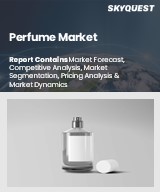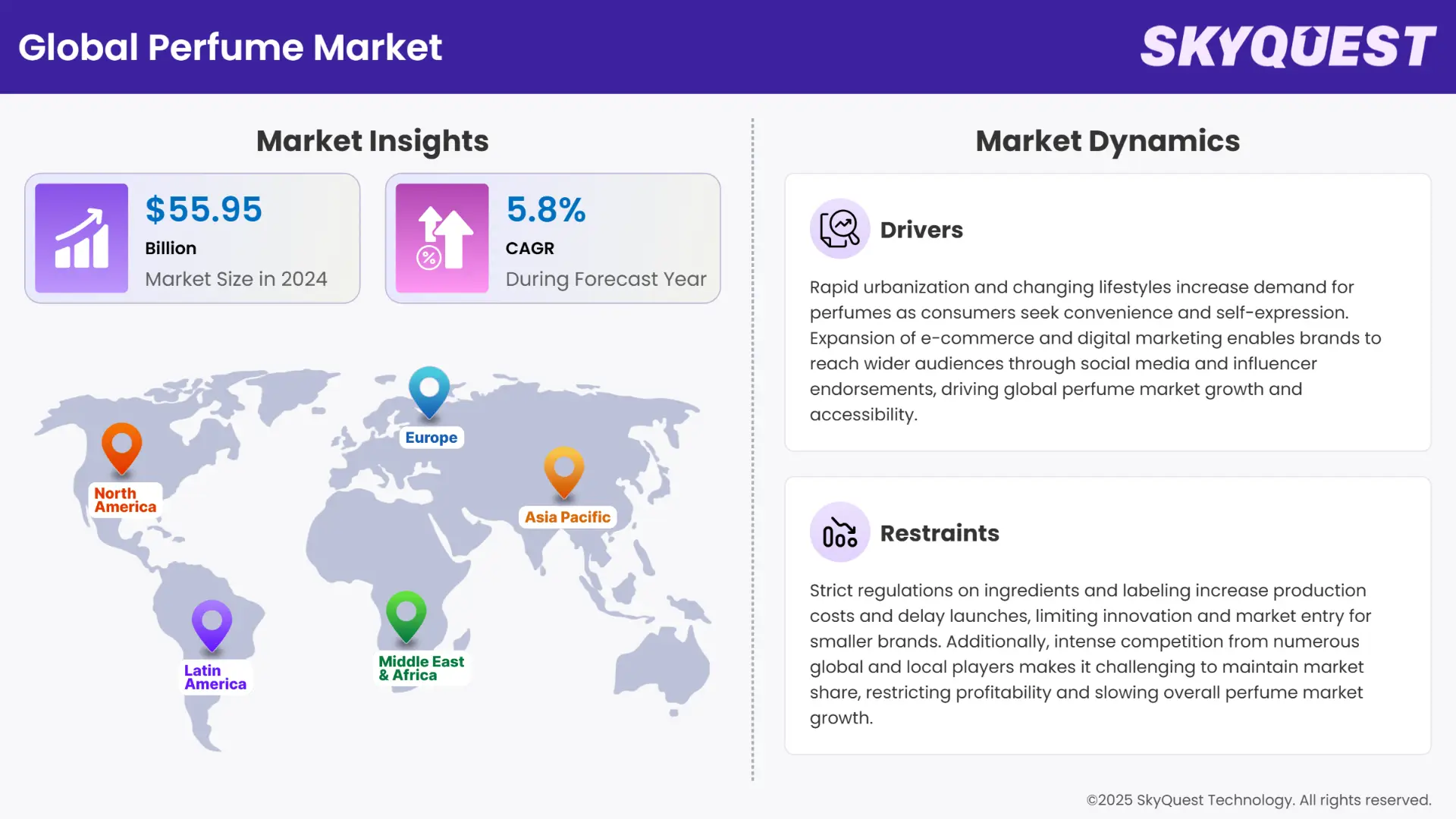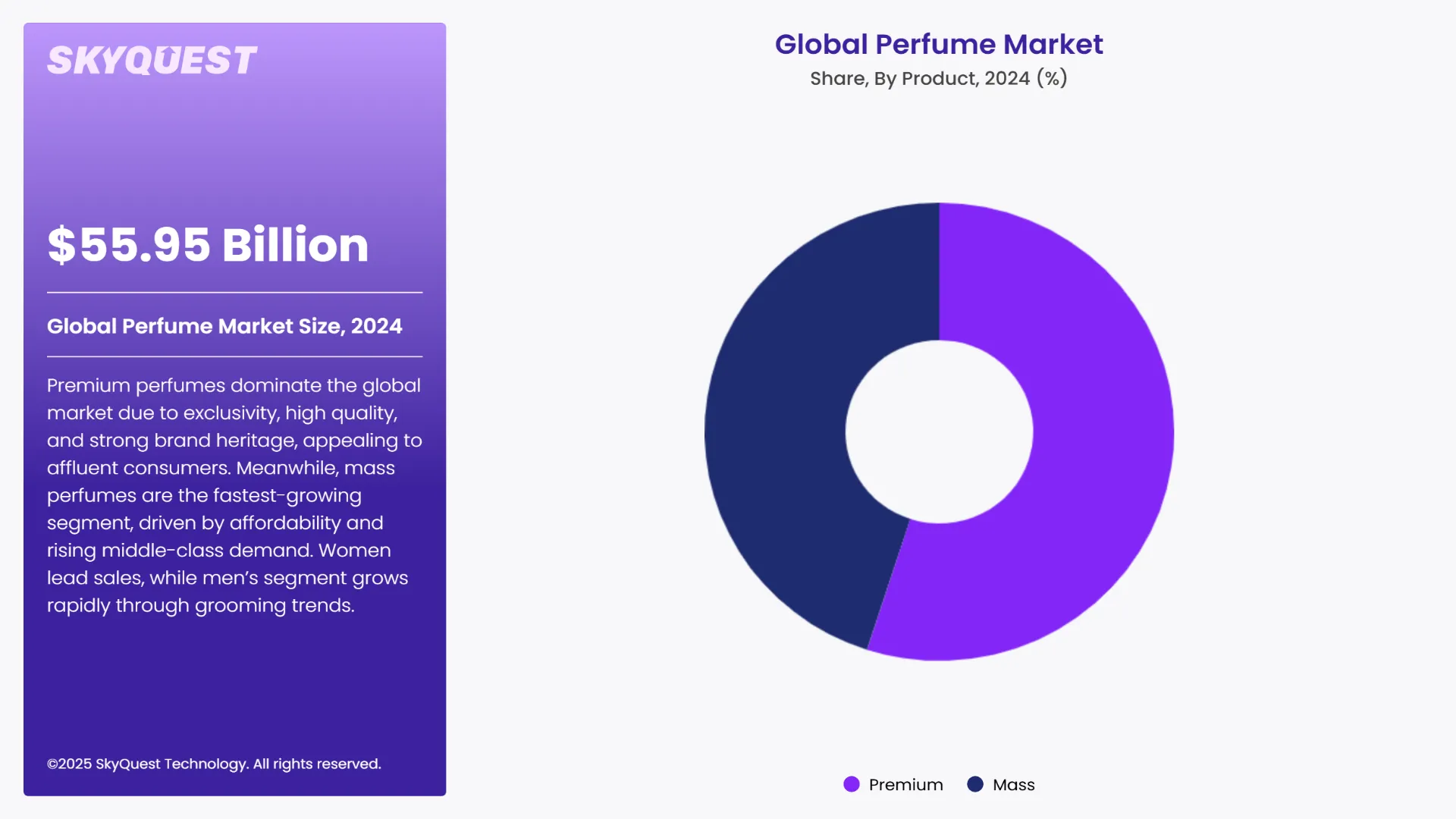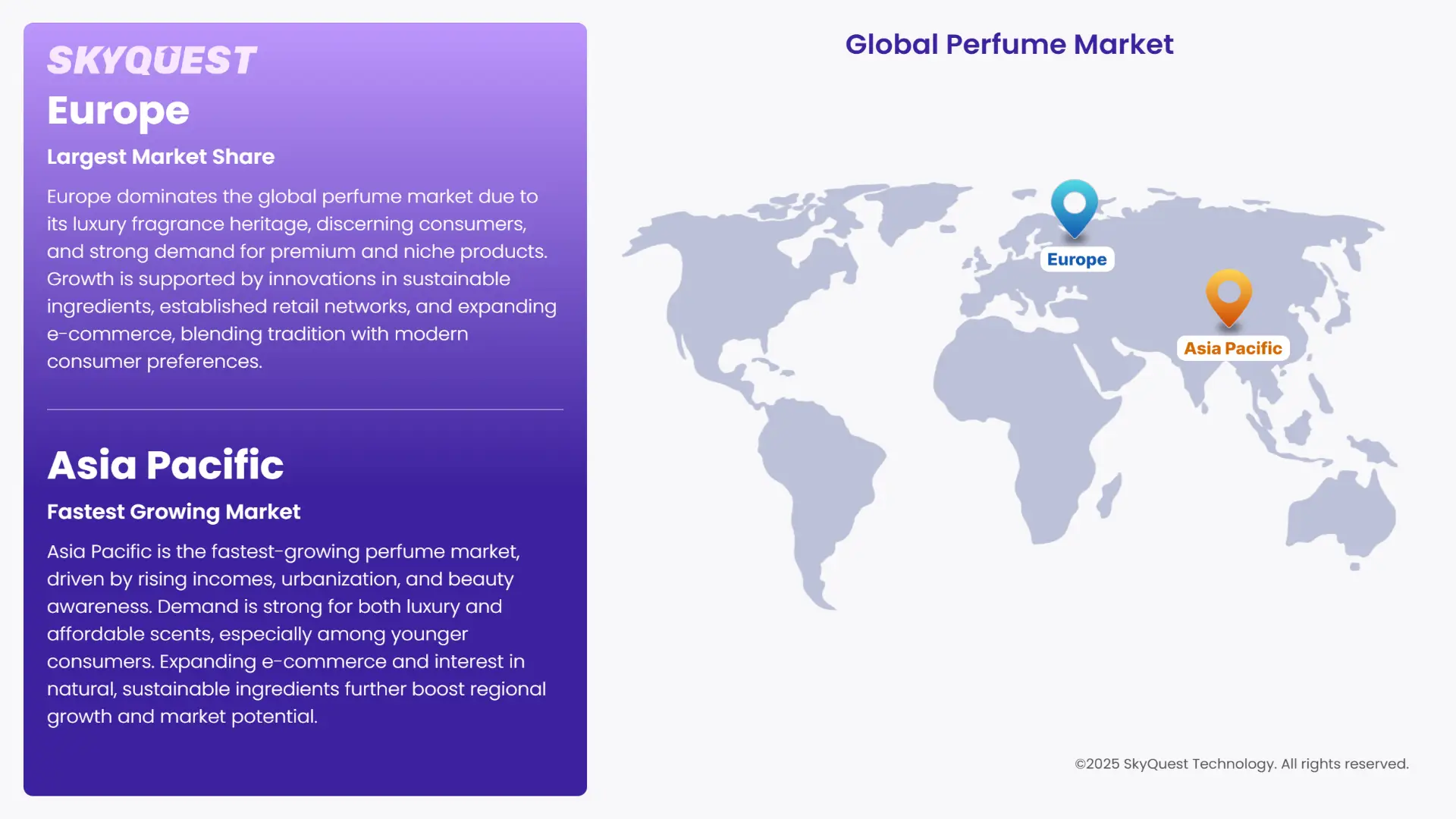
Report ID: SQMIG30L2075

Report ID: SQMIG30L2075
sales@skyquestt.com
USA +1 351-333-4748

Report ID:
SQMIG30L2075 |
Region:
Global |
Published Date: May, 2025
Pages:
192
|Tables:
88
|Figures:
71



Global Perfume Market size was valued at USD 55.95 Billion in 2024 poised to grow from USD 59.2 Billion in 2025 to USD 92.93 Billion by 2033, growing at a CAGR of 5.8% in the forecast period (2026–2033).
Asentancias worldwide, disposable incomes providing those in emerging markets, and specifically, Asia-Pacific and the Middle East continue to increase. Perfumes and luxury and premium perfumes are being used more as vessels of self-expression and status. This trend is supported by urbanization, new lifestyles, and an expanding middle class, and therefore an increasing amount of discretionary income. Most consumers today are looking for singular and high-quality scents signaling their individuality and unique vision, and this desire is pushing those in the fragrance business to start developing a myriad of sophisticated scents. The acceleration for more premium perfume is driving market growth since companies will be looking to invest in new product development, distinctive packaging, and new retail experience to meet the growing expectations of affluent and aspirational consumers.
Instagram, TikTok, and YouTube have changed the way perfume brands interact with consumers and are becoming viable forms of a promotional marketing. Crafting a marketing presence on social media builds brand recognition and aspirational desirability. Luxury fragrances become even more desirable when directly endorsed by celebrities and influencers, who not only promote luxury products but create an aspirational lifestyle and represent glamour. Social media exposure creates buzz and virality that influence purchasing behavior, uniquely among younger consumers who tend to trust social media personalities. The ability to greater engage with a broader consumer base is what established brands would describe as positive visibility.
How does AI Reduce the Time and Cost Involved in Perfume Formulation?
AI is revolutionizing the global perfume market by enabling personalized fragrance creation, which directly increases consumer satisfaction and loyalty. By analyzing individual preferences and behavioral data, AI-driven platforms design custom scents tailored to unique tastes, making perfumes more appealing. This personalization fuels market demand and encourages brands to innovate rapidly. Additionally, AI streamlines product development by predicting successful ingredient combinations, reducing time and costs. For example, companies like Givaudan use AI tools to accelerate formulation and improve sustainability by identifying eco-friendly ingredients. Consequently, AI drives growth and efficiency while aligning the market with evolving consumer values.
In October 2024, NotCo and Cramer introduced an AI-powered fragrance formulator that utilizes NotCo’s AI platform, Giuseppe, to rapidly create unique fragrances. This tool analyzes extensive fragrance data to generate formulations in seconds, significantly reducing development time from months to mere seconds. In trials, several AI-generated scents were approved as market-ready on the first attempt, demonstrating the system's efficiency and potential for innovation in the fragrance industry.

To get more insights on this market click here to Request a Free Sample Report
The global perfume market is segmented based on product, end user, distribution channel, and regions. In terms of products, the market is divided into mass and premium. Based on end user, the market is trifurcated into men, women, and unisex. Based on distribution channel, the market is bifurcated into offline and online. Based on region, the perfume market is segmented into North America, Europe, Asia-Pacific, Central & South America and the Middle East & Africa.
Based on the global perfume market forecast, premium products dominate in the industry focuses heavily on integrating unique scents, sustainable ingredients, and personalized experiences through advanced technologies like AI. Premium perfumes dominate due to their perceived quality, exclusivity, and strong brand heritage, appealing to affluent consumers seeking status and individuality. This segment’s ability to innovate while maintaining luxury appeal drives higher profit margins, sustaining its leadership amid growing demand for sophisticated and personalized fragrances worldwide.
Mass products are the fastest-growing segment in the global perfume market due to their affordability and wide accessibility. Increasing middle-class populations, especially in emerging economies, along with expanding retail channels and aggressive marketing, drive higher adoption. This growth is fueled by consumers seeking everyday fragrances at budget-friendly prices.
Women dominate the global perfume market, making up over more than half of sales due to their frequent purchases and emotional connection to fragrances. They use perfumes for self-expression and personal grooming. Innovations like personalized scents, celebrity endorsements, and eco-friendly formulas enhance appeal. This deep engagement and higher spending power drive the market, ensuring women remain the primary consumers and key influencers in the global perfume market growth and innovation.
The men's perfume market is projected to be the fastest-growing segment in the global perfume industry. This growth is driven by increasing awareness of personal grooming, rising disposable incomes, and a shift towards premium and luxury fragrances. Younger generations, particularly Gen Z, are embracing fragrances as essential components of self-expression and identity.

To get detailed segments analysis, Request a Free Sample Report
As per the global perfume market analysis, Europe is a major hub for the industry, known for its rich heritage in fragrance craftsmanship and luxury brands. The region benefits from strong demand for premium and niche perfumes, driven by sophisticated consumers valuing quality and exclusivity. Innovations in natural and sustainable ingredients appeal to environmentally conscious buyers. Well-established retail networks and growing e-commerce platforms further boost sales, making Europe a key market for both tradition and innovation in the perfume industry.
France Perfume Market
France is the Europe’s perfume market, home to iconic luxury brands like Chanel and Dior. It leads in premium and niche fragrances, driven by a rich heritage in perfumery and strong international exports. French consumers’ appreciation for artistry and quality sustains market dominance. France’s innovation in scent formulation and marketing continuously shapes global perfume market trends, making it a cornerstone of the perfume industry worldwide.
Italy Perfume Market
Italy is a prominent player in the Europe’s perfume market demand, celebrated for its craftsmanship and luxury fragrance houses like Acqua di Parma. Italian consumers value elegance and quality, driving demand for premium perfumes. Italy’s rich cultural heritage and artisanal approach influence global scent trends. The country also focuses on sustainable ingredients and packaging, aligning with evolving consumer values and reinforcing Italy’s role in the luxury perfume sector.
UK Perfume Market
The UK contributes significantly to Europe’s perfume market through a vibrant blend of luxury, designer, and indie brands. British consumers show growing interest in personalized and niche fragrances, fueling innovation. Expanding online sales and strong retail presence boost accessibility. The UK market reflects diverse consumer preferences, supporting both traditional and modern fragrance trends, strengthening its position as a key influencer in the global perfume landscape.
Asia Pacific is a rapidly expanding region in the global perfume market share, fueled by rising disposable incomes, urbanization, and growing beauty awareness. Emerging economies like China and India show strong demand for both affordable and luxury fragrances. Younger consumers drive trends toward personalized and trendy scents. Expanding retail networks and e-commerce platforms enhance accessibility. Additionally, increasing focus on natural and sustainable ingredients aligns with shifting consumer preferences, making Asia Pacific a key growth frontier.
Japan Perfume Market
Japan significantly contributes to the Asia Pacific’s perfume market growth through a growing demand for personalized and luxury fragrances. Younger consumers are driving trends, influenced by social media and global fashion, including Western and K-pop culture. This shift is transforming traditional fragrance preferences. Japan’s strong retail infrastructure and openness to innovation position it as a dynamic and evolving market within the global perfume industry share.
South Korea Perfume Market
South Korea’s perfume market trends is expanding rapidly due to rising interest in niche and luxury fragrances, fueled by K-beauty trends and a growing middle class. Millennials and Gen Z consumers prioritize unique, personalized scents, driving market growth. Strong digital engagement and innovative marketing strategies amplify demand. South Korea’s evolving consumer preferences and increasing spending power make it an important and fast-growing contributor to the global perfume market growth.
North America holds a significant share in the global perfume market growth, driven by high consumer spending and strong demand for luxury and premium fragrances. The region benefits from advanced retail infrastructure and growing online sales channels. Increasing urbanization and evolving lifestyle trends fuel fragrance consumption, especially among millennials. Additionally, innovations in personalized and eco-friendly perfumes attract health- and environment-conscious consumers, solidifying North America’s position as a key market in the regional analysis.
US Perfume Market
The United States is the dominant contributor to North America’s perfume market share, driven by high consumer spending and a strong preference for luxury and premium fragrances. Advanced retail infrastructure, including widespread adoption of the e-commerce industry, is also expected to support market growth. Innovations in personalized scents and sustainable ingredients attract diverse consumers. Celebrity endorsements and brand collaborations further enhance appeal. Together, these factors sustain the U.S. as the largest and fastest-evolving perfume market in the region.
Canada Perfume Market
Canada’s perfume market demand is growing steadily due to increasing disposable incomes and a rising middle class. Urban areas like Toronto and Vancouver show strong demand for niche and personalized fragrances. Consumers are becoming more environmentally conscious, boosting interest in sustainable and cruelty-free perfumes. The influence of global beauty trends and expanding retail channels, including online platforms, also drives market growth. Canada remains a key player in North America’s evolving perfume landscape.

To know more about the market opportunities by region and country, click here to
Buy The Complete Report
Growing Urbanization and Changing Lifestyles
Expansion of E-commerce and Digital Marketing
Strict Regulatory Policies
Intense Market Competition
Request Free Customization of this report to help us to meet your business objectives.
The global perfume market outlook features intense competition among key international players like L’Oréal, Estée Lauder, Coty Inc., and Chanel. These companies focus on innovation, brand diversification, and expanding their digital presence. For example, L’Oréal leverages AI for personalized fragrance experiences, while Estée Lauder invests heavily in influencer marketing and sustainable products. Chanel emphasizes heritage and exclusivity through limited-edition releases. Such strategic initiatives drive brand loyalty and market share growth globally.
As per the global perfume industry analysis, the startup landscape is flourishing, driven by consumers seeking unique, personalized, and eco-friendly fragrances. Startups innovate by combining advanced technology, such as AI and data analytics, with sustainable sourcing. Their agility allows rapid trend adaptation, challenging traditional brands and expanding market variety. This fosters competition, drives creativity, and meets evolving consumer preferences, accelerating overall market growth and diversification worldwide.
SkyQuest’s ABIRAW (Advanced Business Intelligence, Research & Analysis Wing) is our Business Information Services team that Collects, Collates, Correlates, and Analyses the Data collected by means of Primary Exploratory Research backed by robust Secondary Desk research.
As per SkyQuest analysis, the global perfume industry is evolving rapidly, driven by rising disposable incomes, urbanization, and changing consumer lifestyles worldwide. Premium and personalized fragrances are increasingly preferred, with brands leveraging AI and digital marketing to meet diverse tastes and deepen consumer engagement. Sustainability has become a critical focus, as environmentally conscious buyers demand clean, cruelty-free products, influencing innovation in ingredients and packaging.
Regional dynamics, especially in Asia-Pacific and Europe, highlight varying growth drivers and consumer preferences, while startups disrupt traditional models with agile, tech-enabled approaches. Leading international companies continue to invest in R&D, strategic partnerships, and sustainability initiatives to maintain competitive advantage. Overall, the global perfume market share is fueled by innovation, personalization, and a strong shift toward eco-friendly luxury experiences, shaping its future trajectory globally.
| Report Metric | Details |
|---|---|
| Market size value in 2024 | USD 55.95 Billion |
| Market size value in 2033 | USD 92.93 Billion |
| Growth Rate | 5.8% |
| Base year | 2024 |
| Forecast period | 2026–2033 |
| Forecast Unit (Value) | USD Billion |
| Segments covered |
|
| Regions covered | North America (US, Canada), Europe (Germany, France, United Kingdom, Italy, Spain, Rest of Europe), Asia Pacific (China, India, Japan, Rest of Asia-Pacific), Latin America (Brazil, Rest of Latin America), Middle East & Africa (South Africa, GCC Countries, Rest of MEA) |
| Companies covered |
|
| Customization scope | Free report customization with purchase. Customization includes:-
|
To get a free trial access to our platform which is a one stop solution for all your data requirements for quicker decision making. This platform allows you to compare markets, competitors who are prominent in the market, and mega trends that are influencing the dynamics in the market. Also, get access to detailed SkyQuest exclusive matrix.
Table Of Content
Executive Summary
Market overview
Parent Market Analysis
Market overview
Market size
KEY MARKET INSIGHTS
COVID IMPACT
MARKET DYNAMICS & OUTLOOK
Market Size by Region
KEY COMPANY PROFILES
Methodology
For the Perfume Market, our research methodology involved a mixture of primary and secondary data sources. Key steps involved in the research process are listed below:
1. Information Procurement: This stage involved the procurement of Market data or related information via primary and secondary sources. The various secondary sources used included various company websites, annual reports, trade databases, and paid databases such as Hoover's, Bloomberg Business, Factiva, and Avention. Our team did 45 primary interactions Globally which included several stakeholders such as manufacturers, customers, key opinion leaders, etc. Overall, information procurement was one of the most extensive stages in our research process.
2. Information Analysis: This step involved triangulation of data through bottom-up and top-down approaches to estimate and validate the total size and future estimate of the Perfume Market.
3. Report Formulation: The final step entailed the placement of data points in appropriate Market spaces in an attempt to deduce viable conclusions.
4. Validation & Publishing: Validation is the most important step in the process. Validation & re-validation via an intricately designed process helped us finalize data points to be used for final calculations. The final Market estimates and forecasts were then aligned and sent to our panel of industry experts for validation of data. Once the validation was done the report was sent to our Quality Assurance team to ensure adherence to style guides, consistency & design.
Analyst Support
Customization Options
With the given market data, our dedicated team of analysts can offer you the following customization options are available for the Perfume Market:
Product Analysis: Product matrix, which offers a detailed comparison of the product portfolio of companies.
Regional Analysis: Further analysis of the Perfume Market for additional countries.
Competitive Analysis: Detailed analysis and profiling of additional Market players & comparative analysis of competitive products.
Go to Market Strategy: Find the high-growth channels to invest your marketing efforts and increase your customer base.
Innovation Mapping: Identify racial solutions and innovation, connected to deep ecosystems of innovators, start-ups, academics, and strategic partners.
Category Intelligence: Customized intelligence that is relevant to their supply Markets will enable them to make smarter sourcing decisions and improve their category management.
Public Company Transcript Analysis: To improve the investment performance by generating new alpha and making better-informed decisions.
Social Media Listening: To analyze the conversations and trends happening not just around your brand, but around your industry as a whole, and use those insights to make better Marketing decisions.
REQUEST FOR SAMPLE
Global Perfume Market size was valued at USD 55.95 Billion in 2024 poised to grow from USD 59.2 Billion in 2025 to USD 92.93 Billion by 2033, growing at a CAGR of 5.8% in the forecast period (2026–2033).
L’Oréal (France), Estée Lauder Companies (USA), Coty Inc. (USA), Chanel (France), Puig (Spain), Shiseido Company (Japan), LVMH (France), Elizabeth Arden (USA), Amorepacific Corporation (South Korea), Avon Products (USA), Hermès International (France), Inter Parfums (France), Firmenich (Switzerland), Givaudan (Switzerland), Ajmal Perfumes (UAE)
The key driver of the perfume market is the rising consumer demand for personal grooming and luxury fragrances, fueled by increasing disposable incomes, growing fashion and beauty consciousness, and the influence of celebrity endorsements and lifestyle trends.
A key market trend in the perfume market is the growing preference for niche, natural, and personalized fragrances, including organic and sustainably sourced ingredients, driven by consumer desire for unique scents and environmentally conscious products.
Europe accounted for the largest share in the perfume market, driven by strong luxury brand presence, high consumer preference for premium and designer fragrances, established retail infrastructure, and a long-standing culture of personal grooming and fashion.
Want to customize this report? This report can be personalized according to your needs. Our analysts and industry experts will work directly with you to understand your requirements and provide you with customized data in a short amount of time. We offer $1000 worth of FREE customization at the time of purchase.
Feedback From Our Clients